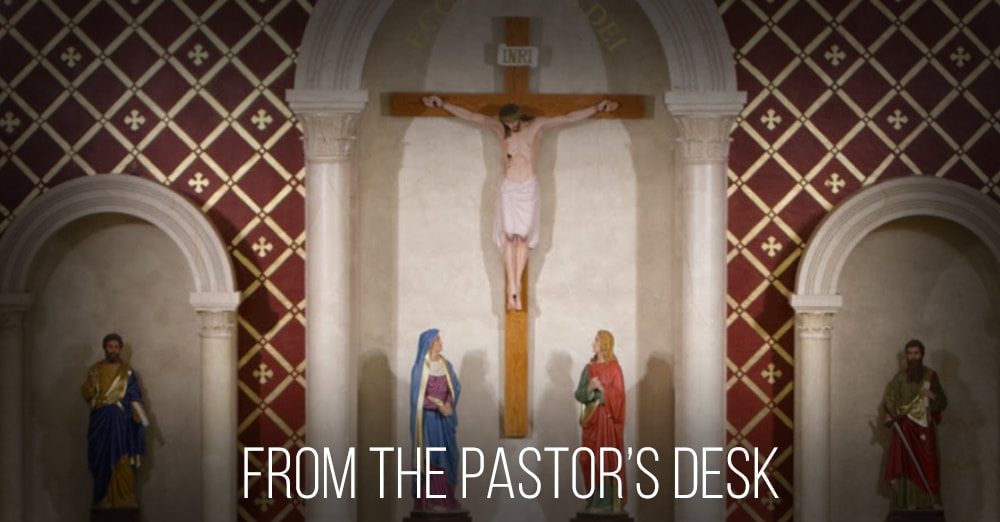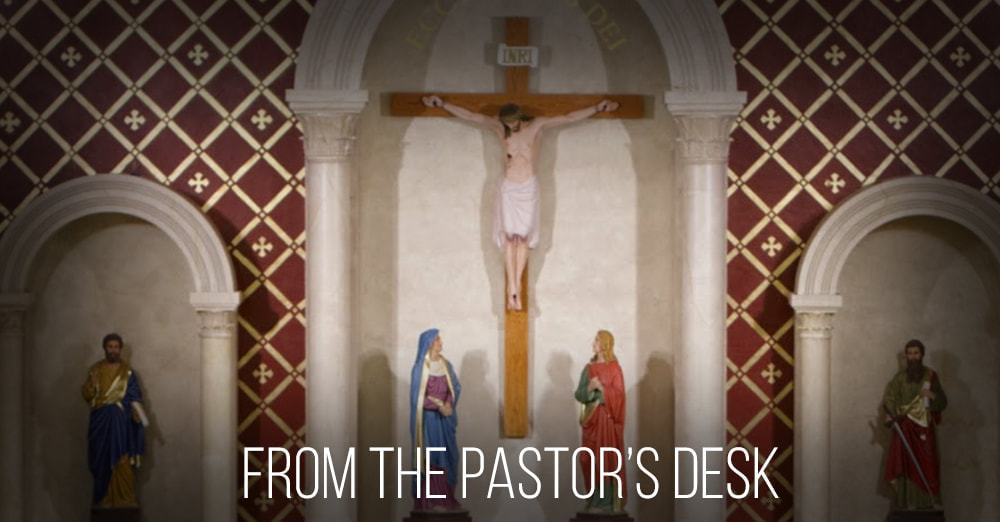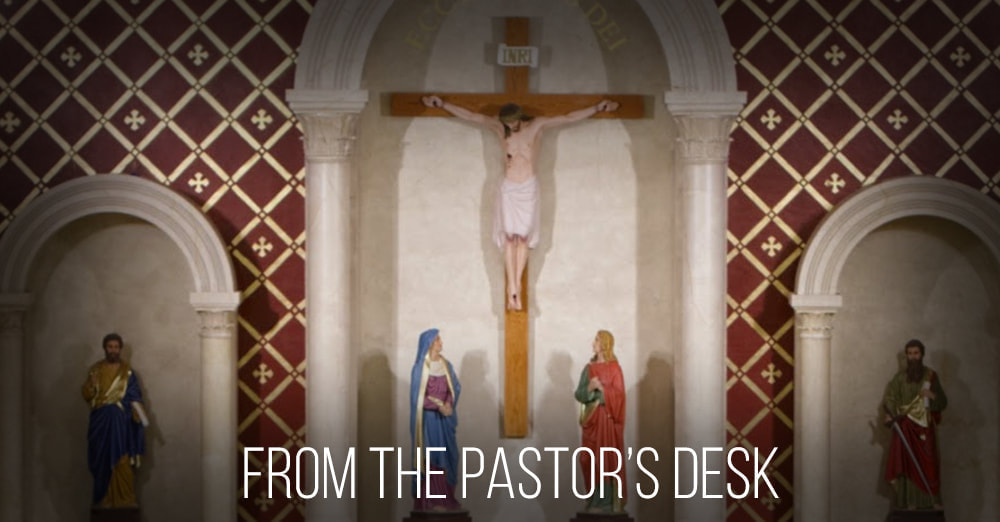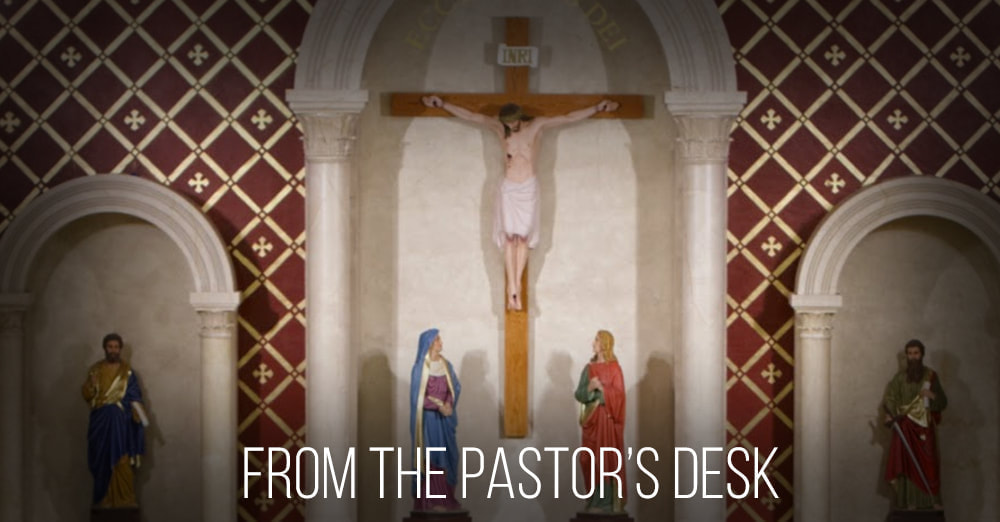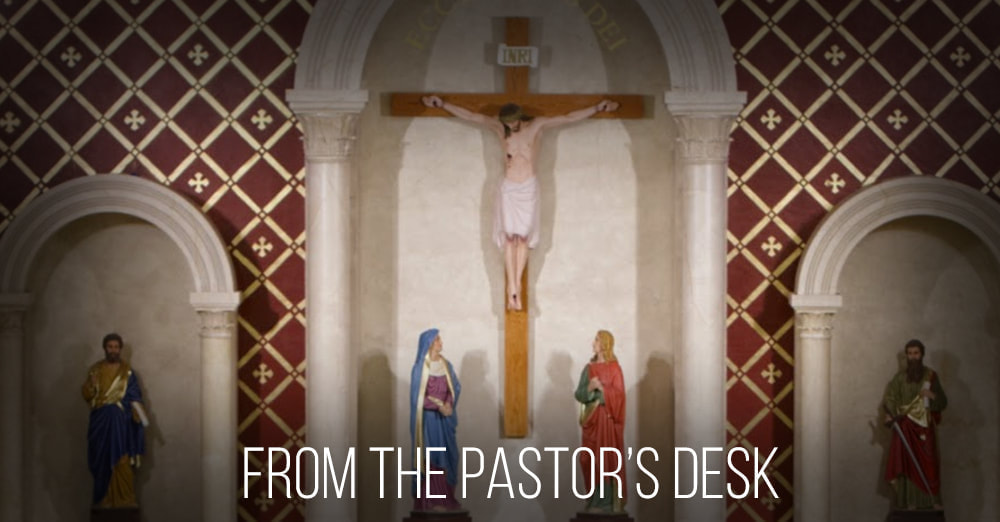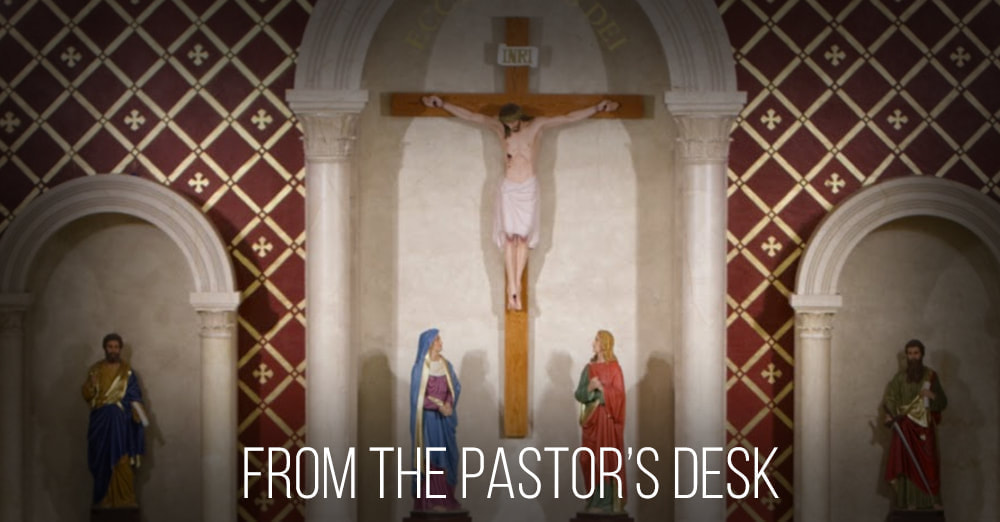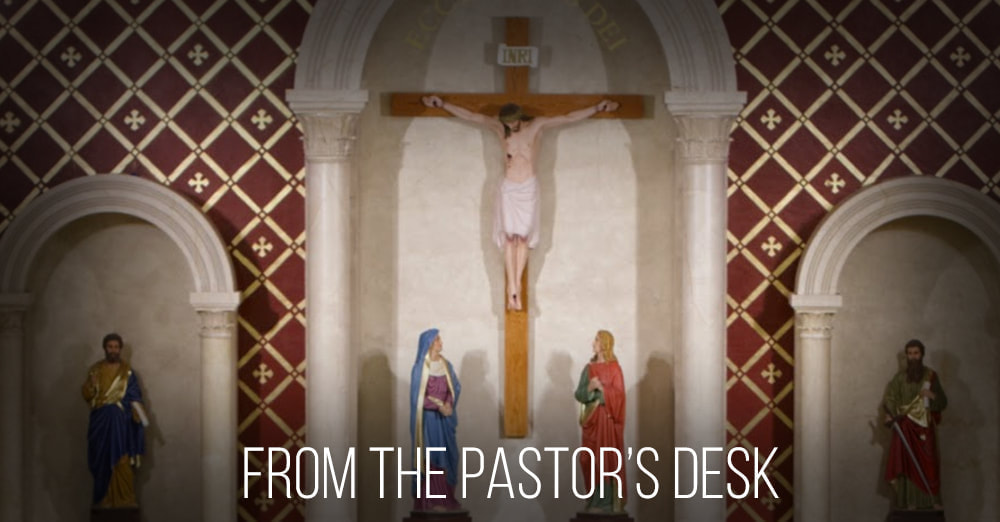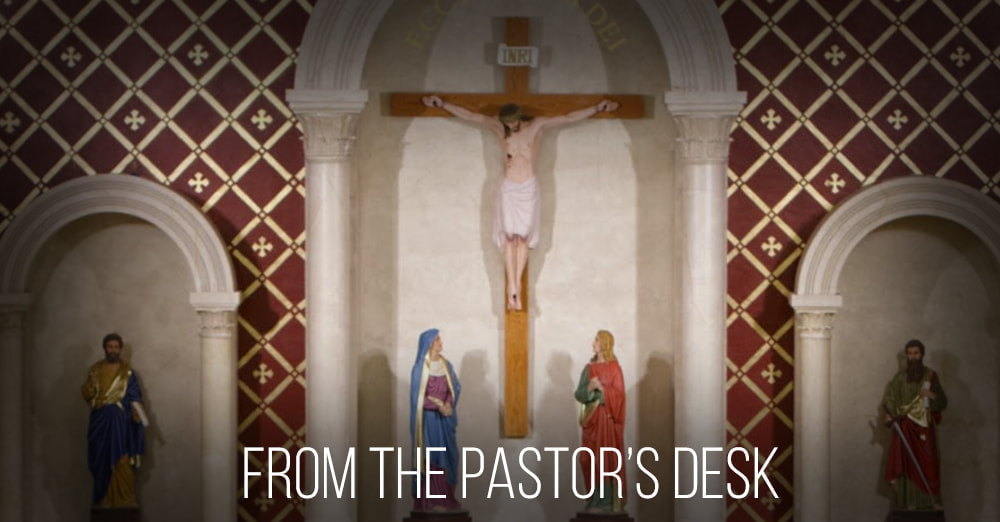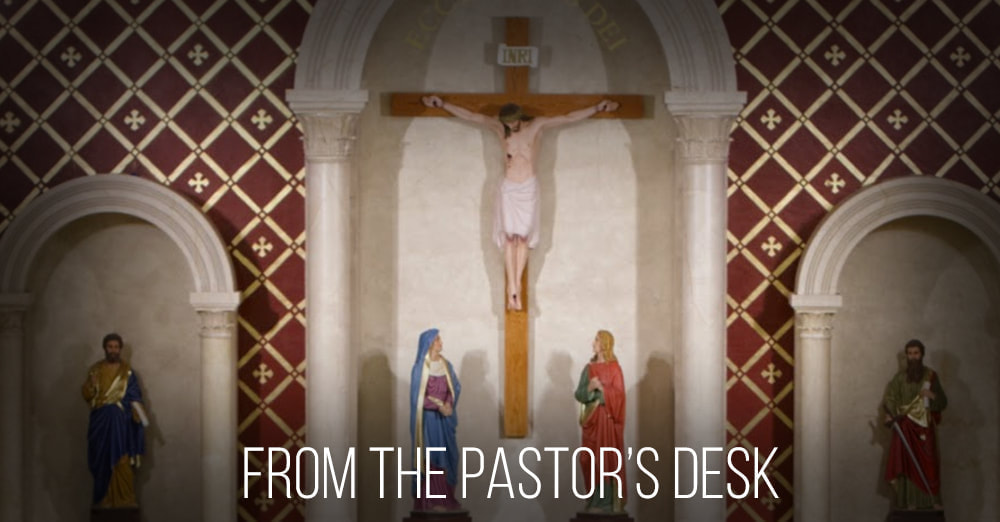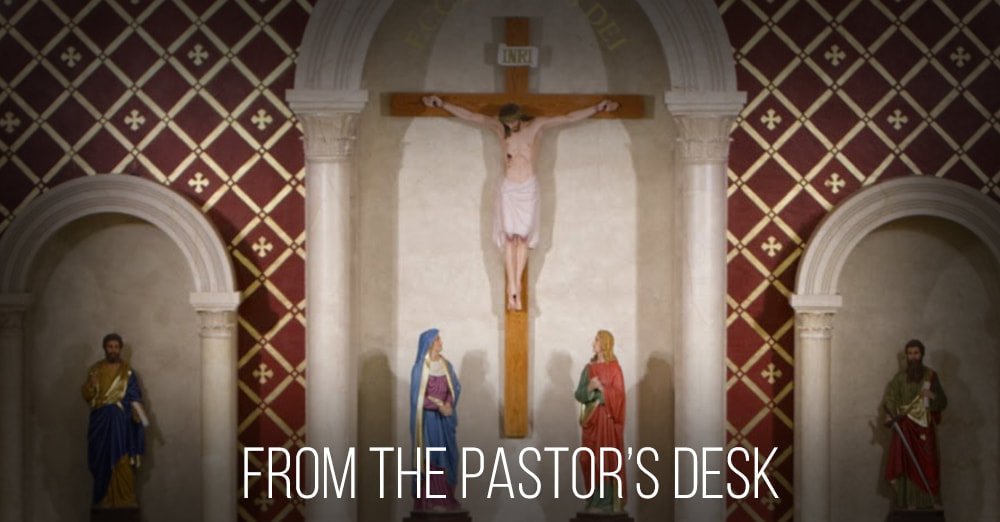|
The first reading for the Mass of the Fourth Sunday of Advent (from the second book of Samuel) records the conversation between King David and (through the prophet Nathan) God. David, having firmly established his reign, now decides that he should build a house (Temple) suitable for the Ark of the Covenant. The prophet conveys to David God’s message that He (God) will instead establish a house for David. This use of the word “house” refers to the royal line of succession - like the “House of Windsor” in the British Monarchy. God promises David that “your house and your kingdom shall endure forever before me.” (2 Samuel 7:16) This promise - made nearly a thousand years before the birth of Christ - is fulfilled in the account recorded in today’s Gospel. God, speaking through His messenger, the angel Gabriel, announces that Mary is to bear a son. “He will be great and will be called Son of the Most High, and the Lord God will give Him the throne of David His father....” (Luke 1:32) The Church marks the Solemnity of the Nativity of the Lord with four Masses: Christmas Vigil Mass, Mass at Midnight, Mass at Dawn, and Mass during the Day. (Both the Lumen Christi Missal and the Missalette provide the different antiphons and Scripture readings for each Mass.) And we will celebrate three here at SSPP & SVdP: 4:30pm Vigil (SVdP), Mass at Midnight (SSPP), and Christmas Day at 9:00am (SSPP) and 9:30am (SVdP). There remains still many troubles in this world, but we still celebrate the Birth of our Lord! I have fond memories from my childhood of attending Midnight Mass with my family, and then again on Christmas day. Though there is no requirement to do so, I would still encourage you to attend a Christmas Day Mass even if you attended Mass during the previous eve. You may want to foster (or renew) this beautiful custom with your family. Be assured that, with Father Williams, Deacons Jerry Ruesch and Tony Biolo and all the staff, I will be pray- ing for all the people of Saint Vincent de Paul and Saints Peter & Paul Church during this Holy Season. May God grant you a Blessed Christmas and a Holy New Year! May God bless you! Fr. Schaller The Second Sunday of Advent always includes the Gospel account with John the Baptist. The prophets in the Old Testament served an indispensable service on behalf of God: they were His messengers who brought comforting words to the suffering, but stern words for the rebellious. John the Baptist is the last, and the greatest, of the prophets. What would Advent be without him? He is the one who announces the arrival of the Messiah. Although, strictly speaking, John announces the public ministry of the (now) thirty-years-old Jesus, the Church has always seen the words of the Baptist as also applying to us and to our preparation for the Lord’s birth. The Baptist’s call for repentance certainly applies to us, as it applied to the contemporaries of Jesus. It is good that the Church observes the different seasons of the liturgical year so that we might use these opportunities to be renewed in faith. The Advent season - if we take our cue from John the Baptist - is a most proper time to reform our lives, to repent from sin, and to seek the Lord’s forgiveness. Each of us was cleansed of sin at the time of our Baptism. For sins committed after Baptism we have recourse to the Sacrament of Penance. The Sacrament of Penance (also referred to as Confession or Reconciliation) is a beautiful expression of God’s love for us. He does not want us to remain in our sins. He desires our salvation and not our condemnation. Has it been a long time since you went to Confession? Maybe even many years? Don’t allow fear or any other thing keep you from experiencing the forgiving Grace of the Lord in the Sacrament of Penance. Now is the time to be reconciled to the Lord through this beautiful sacrament of mercy. You will find the schedule of confessions in this bulletin and in the parish Advent Calendar all our parishioners received several weeks ago. Note especially the City-wide Advent Confessions scheduled from Noon until 6pm, next Sunday, December 17, at SS Peter & Paul. At least 3 priests will be continually available for confession the entire 6 hours.
May God bless you! Fr. Schaller Today, the First Sunday of Advent, inaugurates the new Church year. The Church, in her liturgy, expresses what we believe. So, it makes good sense that we begin with preparations for the coming of the Lord. The problem with observing this season of Advent is that the rest of the culture is celebrating Christmas already! There are even Christian churches that begin decorating their churches for Christmas and singing Christmas hymns by the beginning of December. I suppose some of this is understandable - we just can’t wait for Christmas! We want to start celebrating now. But the Church wisely observes Advent with a spirit of watchfulness and anticipation. In our church you will notice it by the presence of subdued decorations and the Advent wreath (the four candles marking the four weeks of Advent). The music will be the familiar Advent hymns, which help us prepare for Christ’s coming. I strongly encourage you to observe the Advent season in your own homes. Don’t put up the Christmas decorations yet! Or, perhaps you may mark the passage of Advent by putting up the Christmas decorations gradually - one every day until your home is completely decorated by Christmas Eve. Put a small Advent wreath in your home where it can be seen by the whole family (on the dining room table, perhaps). You can mark the progress of Advent in your home as you light an additional candle each Sunday of the season. And, most importantly, you can use this Advent season to deepen your spiritual life by more fruitful participation in the Liturgy of the Church. (Please check the Advent Calendar included with my Advent Pastoral Letter for the complete Mass and Penance schedule.) Advent is a season of grace, and an opportunity to grow in your faith. Make good use of it! May God bless you! Fr. Schaller One of the hallmarks of the teaching of Jesus is the mercy of God. One only needs to recall the parable of the Prodigal Son to confirm that the Father is a loving and merciful God. And yet, He is a just God. Though always ready to forgive the repentant, God still expects us to be accountable. The parable in today’s Gospel (the parable of the Talents) indicates that a response from us is expected and is necessary. Though God is merciful, He is not indulgent. Like any good Father, He expects something from His children. And our response to Him should not be based on fear (like the lazy servant in the parable), but familial love - like that of a devoted child towards his loving father.
The First Sunday of Advent, and the beginning of a new Liturgical Year, is just two weeks away. These past several years have been a time of upheaval, disruption, unrest, and fearfulness. The temporal order - things of this world - will always be a challenge. It is both a spiritual and psychological relief to start the new Church year. I expect we will continue to experience the difficulties of this world. But it is a great consolation to draw our attention to Our Lord’s first coming, and the preparation we annually make to celebrate the birth of Him Who makes all things new. Have you made your pledge to the Diocesan Annual Appeal? If you did not receive or have misplaced your Appeal materials and pledge card, extras are available from the parish office or in the Gather Space (SVdP) or Holy Family Cenacle (SSPP). Thank you for your generous support, and pray for the success of the DAA! May God bless you! Fr. Schaller The Catechism of the Catholic Church (CCC) was published in 1992 (the English translation in 1994) and is an excellent – and authoritative – presentation of the content of the Faith. When read along with the Bible the CCC provides a sure guide for us. But the Bible and the CCC are big books! Wouldn’t it be great if there were a shorter summary of both books? There is. And Jesus Himself provides us with the summary in today’s Gospel. “You shall love the Lord, your God, with all your heart, with all your soul, and with all your mind,” and “You shall love your neighbor as yourself.” I suggest that we need the summary of the Lord AND the rich explanation of the Faith which is found by reading the Bible and the Catechism. So, read your Bible. And read the Catechism. But always refer back to the summary of our Lord to place it all in context. This Wednesday, November 1, is the Solemnity of All Saints when we honor all the holy men and women who have witnessed to the Faith heroically. (See the Mass schedule for both parishes in this bulletin.) The celebration of All Souls follows on Thursday, November 2. It provides us an excellent opportunity to come together to pray in a particular way for our beloved dead. The beloved dead of SSPP will be remembered at the 8:00am Mass on Thursday, Nov. 2; and of SVdP at the 4:30pm Mass on Saturday, Nov. 4. May the souls of all the faithful departed, through the mercy of God, rest in peace. Amen! As I have mentioned in past bulletins, the Diocesan Annual Appeal provides funding for many local, diocesan, national, and universal Church efforts. All our parishioners should have received their letter from the diocese, along with a brochure explaining the Appeal and a personalized pledge card. (Additional brochures and blank pledge cards are available in the Holy Family Cenacle [SSPP] or Gather Space [SVdP], if you did not receive or misplaced your letter.) Every dollar that we exceed the official target will be returned to the parish for the parish’s use. Exceeding our target will NOT cause the target to go up in the future, nor will it change the level of our support to Assumption Catholic Schools. I encourage all our parishioners to contribute to the DAA generously - according to your means. As the old saying goes: many hands make light work. I have placed a ‘thermometer’ poster in the main entry (SSPP – Holy Family Cenacle; SVdP – Gather Space) which will mark our progress: both in numbers of parishioners who contribute, and the total dollars pledged. I’ve already made my gift to the Diocesan Annual Appeal - join me in helping us reach our goal. Please continue to pray for the success of the Diocesan Annual Appeal! Thank you for your generosity! May God bless you! Fr. Schaller Jesus often initiates His own teaching in the Gospels. But He also is prompted to teach certain truths at the instigation of others, or by some circumstance, as He does in today’s Gospel. The same is true for the Church and Her teachings. One of the important aspects of the Catholic Faith is our understanding and belief that there is a development of doctrine over time. This doesn’t mean that our teachings change, but that as new circumstances arise there is the opportunity (and oftentimes the necessity) of clarifying certain teachings. For instance, around the year 300 A.D., some Christians began to spread the idea that Jesus was not truly God, but rather a sort of “superman”, and a creature of the Father. In response, the Bishops met in council in Nicaea to clarify the true teaching about the nature of Christ. The result was the Nicene Creed, which we recite every Sunday. Does this mean that Catholics didn’t believe in the Trinity, or in the human and divine natures of Jesus, before the Council of Nicaea? Of course, they always believed them. But it was only when this belief was challenged that the Church made Her teaching clearer by the formulation of the creed. The same can be said about the Church’s teachings on the authority of the Pope, the Real Presence of Jesus in the Blessed Sacrament, and many other doctrines. When challenges have been made, or when circumstances demand it, the Church follows the example of the Lord: She (the Church) teaches the unchanging Truth to address the questions of an ever-changing world.
We kicked-off the Diocesan Annual Appeal last week. All should have received their Appeal letter from the Bishop. If you didn’t, contact the parish office, or pickup Appeal materials at the Church entrance. I hope all our parishioners will make a generous gift, according to your means, to the Appeal! May God bless you! Fr. Schaller It is a rare person who, once embracing the Faith, is then able to live a life totally and faithfully committed to the Lord. Our faith is for a time strong and vigorous - and then wanes as we struggle through difficulties. (That’s another good reason why Jesus gave us the Sacrament of Confession!) Since God is calling all of us to be saints, we need to seek the assistance of the Holy Spirit, and the Grace of the Sacraments, to persevere in faith every day. And it is never too late to “turn it around” if one hasn’t been living a holy life. As the Lord says in today’s Gospel, it is the “tax collectors and prostitutes” (i.e., the public sinners of the day) who heard the call of repentance and reformed their lives. Lord, help us with Your Grace to reform our lives.
The kickoff of The Diocesan Annual Appeal is two weeks from today. The DAA provides funding for many worthy local, diocesan, national, and universal Church efforts. Before the DAA parishes had a second collection every month for different needs of the Church in our country and around the world. The Diocesan Annual Appeal provides the means to support all these efforts more effectively. $500,000 of the Appeal’s total budget of $6 Million goes to support those needs. Locally the Appeal provides more than $530,000 of support to the Catholic Schools in our diocese. This funds training for teachers, as well as direct aid to those schools (and parishes) that carry a significant financial burden. This helps the Church fulfill its mission of providing an excellent Catholic school for families all around the Diocese. In two weeks all our parishioners will receive their letter from Bishop Callahan, along with a brochure explaining the Appeal and a personalized pledge card. Every dollar that we exceed the official target is returned to the parish for each parish’s use. Exceeding our target will NOT cause the target to go up in the future, nor will it change the level of our support to Assumption Catholic Schools. (Both SSPP and SVdP generously support ACS.) I encourage all our parishioners to contribute to the DAA generously - according to your means. As the old saying goes: many hands make light work. Pray for the success of the Diocesan Annual Appeal! May God bless you! Fr. Schaller How would you like to get a full day’s wage after only doing one hour of work? That is what happens in the parable Jesus tells in today’s Gospel. Although one should be cautious not to use this parable as the basis for justice in the workplace, it does express the difference between what we understand as human justice and what God gives us out of His Divine Generosity. As the prophet Isaiah tells us in the first reading, God’s thoughts are not our thoughts, nor are His ways our ways. God is always more generous to us than we deserve.
Recognizing God’s generosity should spur us on to be generous as well. In three weeks we will kick off the Diocesan Annual Appeal. The DAA was begun 26 years ago in order to provide a more consistent and effective means of funding the many local, diocesan, national, and universal Church efforts. It replaced 12 annual collections and reduced the annual amount of money that the parishes pay to support the Diocesan offices. Each parish’s target is based upon the annual regular income, number of households, and the number of children enrolled in Catholic Schools (more students=lower target). From its beginning in 1997, the DAA was set up so that once a parish met its target, any amount over would be sent back to the parish as a ‘rebate’. This rebate is NOT considered in the formula for determining the following year’s target. Nor is the rebate used in the formula for determining the amount of support to the Catholic Schools (for SVdP & SSPP, Assumption Catholic Schools. We contribute generously to the support of Assumption Catholic Schools and will continue to do so.) The DAA is, therefore, an effective way to meet our obligations to support the various works of the Church AND (when we exceed our target) to provide additional money for our own parishes’ needs. May God bless you! Fr. Schaller The Church presents us with three readings from the Sacred Scriptures each week at Sunday Mass. This is done so that we can be exposed to more of the Bible and can learn from the truth presented in the Word of God. Today’s lessons instruct us in the importance of forgiving others from the heart. Typically, we appeal to this teaching when we desire to be forgiven, but conveniently forget it when it comes to forgiving others who have wronged us. Don’t let hatred or vengeance blacken your soul. Listen to what our God teaches us in the Scriptures.
The Church’s liturgical year is filled with many beautiful celebrations: commemorating the lives of the Saints and of the Blessed Mother, and especially celebrating the Feasts of the Lord. The Feast of the Holy Cross was observed September 14. Hail Cross! Our only hope!! This Feast calls our attention to the means by which our Lord accomplished our salvation: on the Cross. We just observed the 22nd anniversary of the attack on 9/11. Who can forget that terrible experience of evil visited on our country? And who can forget the sign of hope which emerged from the rubble where once the Twin Towers stood? Do you remember how – seemingly miraculously – there appeared in the midst of that destruction the Cross formed by the intersection of two steel I-beams? The Cross is truly one of the deep mysteries of our Faith. God desired to have His own Son experience our own lives, and our own suffering. The Cross represents His suffering – and ours – by which we are also saved. It's now been over 10 weeks since SS Peter & Paul and St. Vincent de Paul parishes came to be served by a common Pastor and Associate Pastor. How are you doing? How am I doing? Among my goals as pastor is to preserve the identity of each parish while doing those things in common which can benefit both parishes. So today we begin publishing a joint parish bulletin. You’ll continue to receive the news and info proper to your parish, while also seeing what’s happening in the other Eastside parish. Let me know how you like it – or how it can be improved. May God bless you! Fr. Schaller "No man is an island.” The English poet John Donne wrote those words nearly 400 years ago. They express a truth found also in the Sacred Scriptures, especially in today’s readings. None of us lives in a vacuum; rather we are bound together by our common humanity. And much more than that, we are bound together by our Faith, by Baptism. We are truly responsible for each other. This is most easily seen within the family, where parents take care of their children and children watch out for each other. This also provides the motive for evangelization. We need to do all we can to bring others to know, love, and serve God, and to live the Faith. Out of love for others, we should assist them with their physical needs, and teach them in word and action the moral and spiritual truths of our Faith.
It has been an adjustment for our two Eastside Parishes of WI Rapids, SSPP & SVdP, these past two months. The changed Mass schedule is certainly the most noticeable and has the biggest impact on many families’ Sunday routines. The staff from both parishes is also adapting to some changes. We have converted both parishes to a new phone system which will provide better service and at a much-reduced cost. We have been making needed improvements in the St. Vincent de Paul parish office building (former convent, then rectory), which now also hosts the central office of Assumption Catholic Schools (north end of the first floor). This provides a mutual benefit: rent for SVdP and modest cost to ACS. By the end of the month the SSPP parish secretary will be moved to the SVdP parish office building, where Fr. Williams and I already have our offices. Each parish’s secretary works part-time. By staggering their hours, we will be able to provide greater accessibility for all our parishioners. And beginning next Sunday, September 17, we will publish a single bulletin for the Eastside Parishes of WI Rapids. That will reduce bulletin preparation and provide fuller information for both SSPP & SVdP parishioners. I have been attending the Catholic Medical Association conference in Phoenix, AZ the past week, and will be back this Tuesday. My thanks for Fr. Williams for holding down the fort! May God bless you! Fr. Schaller |
